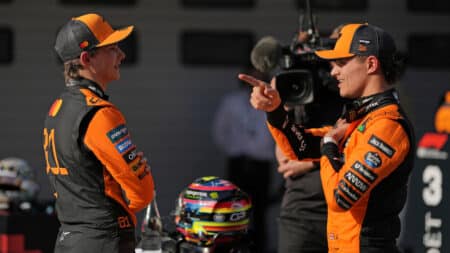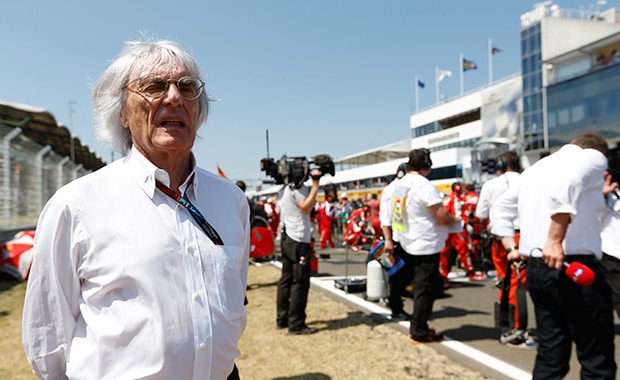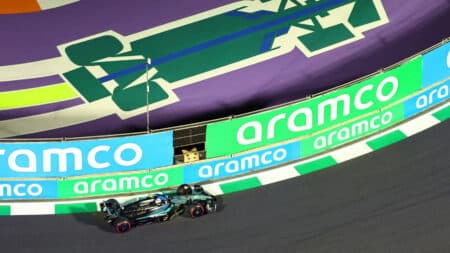
Norris must deal with Piastri's pace – or suffer Mark Webber's fate
As Oscar Piastri moved into the championship lead, his manager Mark Webber's example should serve as a warning to Lando Norris, says Mark Hughes

OK, deep breath. This month in Motor Sport we’ve stuck our figurative neck out. As the striking cover of the April issue states so clearly, we believe it is ‘Time for a Formula 1 Revolution’.
 We’re fast approaching the start of the new Grand Prix season, one that already promises a monumental shake-up from the front to the back of the grid, and an all-new era of ‘efficiency’ motor racing. Is that not revolutionary enough?
We’re fast approaching the start of the new Grand Prix season, one that already promises a monumental shake-up from the front to the back of the grid, and an all-new era of ‘efficiency’ motor racing. Is that not revolutionary enough?
Not for us, I’m afraid. And judging by the countless emails, letters, website comments and face-to-face conversations we’ve had from and with our readers in recent years, it’s not enough for many of you, either.
Frankly, we’ve had our fill of ‘fake’ Grand Prix racing. We’ve all had to adapt to new levels of artifice in F1 in the DRS/rubbish tyres era. But double points for one or three races, designed to add spice to a show that must generate otherworldly revenues for shareholding investment companies that have no interest or intention to nurture the sport from which it feeds… It’s sent us over the edge.
So instead of producing a meaningless preview to a season that is impossible to predict, we present our vision for an alternative future for Grand Prix racing. One that draws on the spirit of F1 as once it was, but embraces a changing world in which motor racing is struggling to find its place.
Bernie Ecclestone is the fulcrum around which F1 currently revolves. He has been the spark for almost everything we know of as modern Grand Prix motor racing – both good and bad. But we’ve stated before, and we state again now: we believe it’s time for him to go, whatever happens in (and out of) the German courts in the weeks and months to come.
Whenever that day dawns, what happens next is the great unanswered – and largely unaddressed – question in modern motor racing. And so we come to our intention of publishing this new framework for F1. This isn’t simply to knock a sport and the man who has built it up; it is designed to take the initiative, to kick-start a debate, to inspire positive action, not only among fans but also among the movers and shakers who invest so much within the sport to make it all happen. What should be the template for F1’s future? How far off course has F1 strayed from its raison d’être? Is genuine revolution – commercially, technically, sportingly, humanly – really possible?
Here are the key principles to the framework that Grand Prix editor Mark Hughes presents in our pages:
I’m not going to repeat Mark’s story word for word in all its detail (we do, after all, hope you might buy the magazine!). But trust me, these principles are all fleshed out with sound logic and pragmatism. Is some of this radical? Yes, certainly. Is this vision naïve? We’d argue absolutely not. Is it realistic? Well, this is where it really gets tricky.
To embrace radical change, first you must acknowledge that problems exist. Within F1, however, too many influential people refuse to recognise the sport is in trouble – despite 50 million-odd TV viewers having apparently deserted it during the past year. There are so many key figures with vested interests – doing very nicely as things stand, thank you very much. Why rock this gold-plated super-yacht?
Because, as Red Bull and Renault appear to be discovering on track, a position of strength can weaken very quickly. Nothing stays the same forever. That’s why we’d like to see the process begin now, rather than waiting for the inevitable chaos of the post-Ecclestone wasteland.

Red Bull was quick to keep prying eyes out of the garage when things went wrong in Jerez
It’s our sport, not CVC’s. Together, let’s take it back.
Elsewhere in the April issue, editor-in-chief Nigel Roebuck also dwells on the artifice of F1, in conversation with both Alain Prost and Martin Brundle; Andrew Frankel pays tribute to US F1 ace Peter Revson, who died 40 years ago this month; Simon Taylor lunches with our new website columnist Paul Tracy, who lifts the lid on his colourful Indycar career; and there’s also a chance to win a terrific package trip to the Le Mans 24 Hours in June, to witness Porsche’s long-awaited return to the race it aims to reclaim from Audi. More than ever, this year’s Le Mans is one race you won’t want to miss.

As Oscar Piastri moved into the championship lead, his manager Mark Webber's example should serve as a warning to Lando Norris, says Mark Hughes

General Motors has pushed back its F1 entry as an engine supplier to 2029, but what does it mean?

As Mercedes dropped down the F1 order in Saudi Arabia, team boss Toto Wolff found a hope in Kimi Antonelli's performance for the team

Zak Brown is still adamant on his approach that Lando Norris and Oscar Piastri are ‘number ones’ at McLaren. But how long will it be before history repeats itself and takes a sour turn?